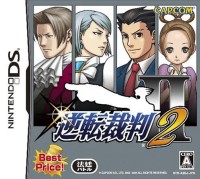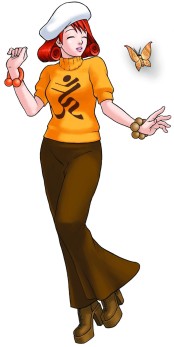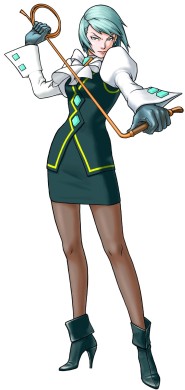
As a tribute to the bestest game ever, I’ll dedicate this post to Gyakuten Saiban 2/Phoenix Wright: Ace Attorney – Justice For All.
I’ve played through the Japanese release of the game, which includes an English translation (though with quite a few grammar errors). So if you don’t want to wait for an European release, it’s quite possible to import the Japanese release.
This game takes place roughly a year after the first game, and the cast includes many of the characters from the first game, but introduces many new characters too. Phoenix Wright (of course), Maya, Mia, Gumshoe and Wendy Oldbag (she’s just priceless!) are there, to mention a few.

The graphics are more or less the same as in the first game, with added graphics for new people and locations. There are a few more animations added for some of the old characters, but there aren’t any radical changes. I feel that the backgrounds in many of the new locations are more colorful, but maybe that’s just because I’m so used to the old backgrounds that they seem boring now.
Most of the music has been changed, and though I didn’t really like it in the beginning, it’s grown on me I guess. But I still think the court music in the first one gave a bit more “action” feel than the new one… There are a few tunes that I kind of like though, like Pearl Fey’s tune, which is based on the old “Gyakuten Sisters” tune, but “cutified”, so to say.

The gameplay is mostly unchanged, with the three main exceptions being:
- Whenever you can present evidence, you can now also present character profiles. In the first game, only items could be presented as evidence.
- Phoenix Wright now has a “health” bar which is decreased when he does something wrong in court, and the health is kept during the whole chapter/case, so it isn’t automatically refilled between different parts of the same chapter. To refill the health, you need to look at the next new feature:
- Phoenix Wright 2 features so-called Psyche Locks, which are “locks inside people’s hearts”. These locks appear during the “detective” part of the game (where you walk around and talk to people to find evidence). To unlock the Psyche Locks you have to present evidence, but showing the wrong evidence will lower Phoenix Wright’s health. Losing all health won’t end the game though, you’ll just have to start the unlocking over from the beginning, with only “one” health left. Successfully unlocking will recover half of the health.
The changes does give a bit more variation to the detective part, which can still be frustrating when you can’t figure out where you need to go to progress the story. However, I had relatively little trouble working through the game, maybe because I already know about the different techniques used in the first game to progress the story.
The game seems to be a little bit shorter than the first one, since they didn’t add any new cases to it, so it’s mostly just a port of the second GBA game. The music is improved from the GBA version though, I’ve heard. And it’s of course still possible to shout “Hold it!” and “Objection!” with the mic like in the first DS game. Anyway, the story is quite good, and I definitely recommend the game to anyone who likes a game with a good story (and who doesn’t mind reading a lot and thinking a bit when playing a game).
Here are a few more links concerning this game:
 – A Phoenix Wright fansite with lots of downloadable contents
– A Phoenix Wright fansite with lots of downloadable contents- Objection! – Make your own objections!
- Phoenix Wright cosplay pictures – seems to be a Chinese website, so I guess those people must/could be Chinese..? Why are so many of the male characters cosplayed by females?
- Gyakuten Saiban livejournal community – Great stuff is found here.
- Orchestral versions of Phoenix Wright music samples – It’s neat!